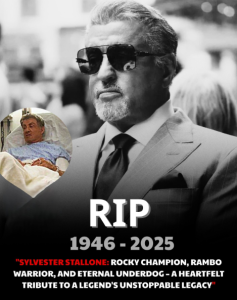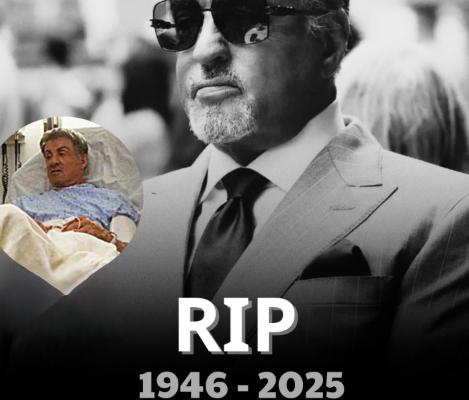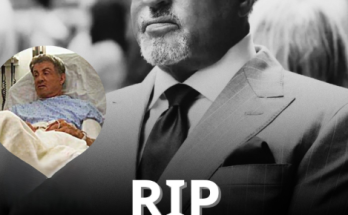Sylvester Stallone: Rocky Champion, Rambo Warrior, and Eternal Underdog – A Heartfelt Tribute to a Legend’s Unstoppable Legacy
Few names in Hollywood carry the kind of emotional weight and universal recognition that Sylvester Stallone commands. For nearly five decades, the man known simply as “Sly” has embodied the spirit of resilience, courage, and relentless determination. His journey from a struggling young actor with a dream to one of cinema’s most enduring icons is more than a Hollywood success story—it’s the story of the human spirit refusing to give up.
Born in New York City in 1946, Stallone’s life began with challenges that would have discouraged many. Complications during his birth left part of his face paralyzed, resulting in the trademark slurred speech and curled lip that would later become his signature. Bullied for his appearance and dismissed by casting directors who thought he’d never make it in film, Stallone learned early what it meant to fight against the odds.
But within him burned a fire that no rejection could extinguish. In the early 1970s, while barely scraping by as an unknown actor, Stallone watched a boxing match that changed his life forever — the 1975 bout between Muhammad Ali and Chuck Wepner. Wepner, a heavy underdog, was knocked down but kept getting back up, refusing to quit. That night, inspiration struck. Stallone went home and wrote a screenplay in three days about a small-time boxer from Philadelphia who got one shot at greatness. That boxer was Rocky Balboa.
When the script was finished, producers loved it—but they didn’t want Stallone to star. They offered him over $300,000 to sell it and walk away, a fortune for someone who at that time had just $100 in his bank account and was living in a small apartment with his beloved dog. But Stallone refused to give up the role. He believed he was Rocky, and that no one else could tell the story as truthfully. His gamble paid off.
Released in 1976, Rocky became an instant classic. It won three Academy Awards, including Best Picture, and catapulted Stallone to worldwide fame. More importantly, it gave audiences something they desperately needed: hope. The image of Rocky Balboa running up the steps of the Philadelphia Museum of Art, arms raised in triumph, became a symbol for dreamers everywhere.
But Stallone didn’t stop there. He carried that same defiant energy into the 1980s, where he created another legendary character: John Rambo. While Rocky was about perseverance and heart, Rambo spoke to pain, loss, and the aftermath of war. The character, a troubled Vietnam veteran struggling to reintegrate into society, gave voice to a generation of soldiers who felt forgotten. The first film, First Blood (1982), was both action-packed and emotionally powerful, showing Stallone’s range as both actor and storyteller.
By the mid-1980s, Stallone had achieved something few in Hollywood ever do — he wasn’t just a star, he was a symbol. Rocky IV and Rambo: First Blood Part II made him a global phenomenon. Yet, what kept Stallone’s appeal timeless wasn’t just the muscles or the explosions—it was the sincerity behind his performances. Beneath the action hero exterior was always a man fighting for dignity, redemption, and love.
Off screen, Stallone faced as many battles as his on-screen alter egos. There were box-office flops, personal tragedies, and moments of doubt. Yet, time and again, he rose back up. He reinvented himself with projects like Cop Land (1997), where he took on a serious dramatic role that earned critical praise, and later, with Rocky Balboa (2006), a film no one expected him to make—let alone make well. But once again, Stallone silenced the skeptics.
In Rocky Balboa, he portrayed an aging fighter stepping into the ring one last time, not to prove he could win, but to prove he still had something left inside. The film was deeply personal, mirroring Stallone’s own career and reminding audiences that greatness doesn’t fade with age—it evolves.
Then, in 2008, he returned to Rambo, offering a raw, brutal depiction of survival and the toll of violence. A decade later, in Creed (2015), Stallone passed the torch to a new generation while revisiting his most beloved character in a fresh and emotional way. His portrayal of an older, wiser, and grieving Rocky earned him a Golden Globe and an Academy Award nomination. Watching him mentor Adonis Creed was more than a cinematic moment—it was a reflection of Stallone’s real-life journey from fighter to legend.
Yet, behind the fame and the films, Stallone has always been remarkably grounded. He’s open about his failures, his regrets, and his constant pursuit of growth. He once said, “It ain’t about how hard you hit; it’s about how hard you can get hit and keep moving forward.” That line from Rocky Balboa isn’t just a movie quote—it’s his life philosophy.
Today, Stallone’s legacy stretches far beyond Hollywood. He’s inspired athletes, artists, soldiers, and everyday people who see a bit of themselves in his characters. For those who have ever felt overlooked, underestimated, or told they weren’t enough, Stallone’s story offers proof that grit, passion, and self-belief can defy the odds.
Even in his later years, Stallone continues to evolve. Whether through the Expendables series, his work on streaming projects like Tulsa King, or his behind-the-scenes roles as writer, director, and producer, he remains a creative force who refuses to slow down. Each new project feels like another round in an endless fight — not for fame, but for purpose.
As time moves forward, one truth remains: Sylvester Stallone isn’t just a movie star; he’s a living embodiment of perseverance. The boy who once couldn’t find work became a man who created two of the most iconic characters in cinema history. The actor who was told he couldn’t act became the storyteller who defined determination for generations.
In every frame of Rocky running through the streets of Philadelphia or Rambo trudging through the jungles of war, there’s the same message—keep going. Keep fighting. Never surrender to doubt.
And maybe that’s why Stallone will forever be loved—not because he plays heroes, but because he is one in spirit. His legacy isn’t just measured in awards or box office numbers. It’s measured in the millions of hearts that found courage, hope, and strength because of him.
So here’s to Sylvester Stallone—the eternal underdog, the relentless warrior, the storyteller who taught us that life’s greatest victories come not from how we start, but from how we choose to stand when we’re knocked down.
Because as long as there are people who believe in second chances, there will always be a little bit of Rocky and Rambo in all of us.


